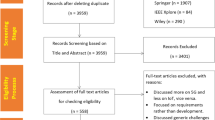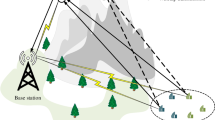Abstract
With the development of the Internet of Things (IoT), mobile edge computing based on Low Earth Orbit (LEO) satellites has attracted extensive attention. LEO satellites can break through the geographical restrictions, which have wide coverage and flexible deployment. They are the choice of future mobile communications. In this article, we consider the three-tier architecture of LEO satellites, relay nodes, and IoT devices with sensors. In this architecture, the IoT devices can choose devices with better communication conditions or base stations as relay nodes to assist task and data scheduling, which can effectively reduce system energy consumption and delay in the process of task and data scheduling. Moreover, we study computational resource allocation strategies and data scheduling strategies to minimize system energy consumption. Based on Lyapunov technology, we transform the problem into three sub-problems, namely local scheduling, data scheduling from IoT devices to relay devices and data scheduling from relay devices to LEO satellite. To solve three sub-problems, we design the sensory data scheduling algorithm (SDSA). Finally, we carry out simulation experiments to verify the performance of the algorithm.










Similar content being viewed by others
References
Yang, Y., Yang, X., Heidari, M., Khan, M. A., Srivastava, G., Khosravi, M. & Qi, L. (2022) Astream: Data-stream-driven scalable anomaly detection with accuracy guarantee in iiot environment, IEEE Transactions on Network Science and Engineering, pp. 1–1, .
Liang, W., Hu, Y., Zhou, X., Pan, Y., & Wang, K.I.-K. (2022). Variational few-shot learning for microservice-oriented intrusion detection in distributed industrial iot. IEEE Transactions on Industrial Informatics, 18(8), 5087–5095.
Huang, J., Gao, H., Wan, S., et al. (2023). Aoi-aware energy control and computation offloading for industrial iot. Future Generation Computer Systems, 139, 29–37.
Kong, L., Li, G., Rafique, W. Shen, S. He, Q., Khosravi, M. R., Wang, R., & Qi, L. (2022) Time-aware missing healthcare data prediction based on arima model, IEEE/ACM Transactions on Computational Biology and Bioinformatics
Xu, X., Fang, Z., Zhang, J., He, Q., Yu, D., Qi, L., Dou, W. (2021) Edge content caching with deep spatiotemporal residual network for iov in smart city, vol. 17, jun .
Wang, F., Zhu, H., Srivastava, G., Li, S., Khosravi, M. R., & Qi, L. (2022). Robust collaborative filtering recommendation with user-item-trust records. IEEE Transactions on Computational Social Systems, 9(4), 986–996.
Wang, F., Li, G., Wang, Y., Rafique, W., Khosravi, M. R., Liu, G., Liu, Y., & Qi, L. (2022) Privacy-aware traffic flow prediction based on multi-party sensor data with zero trust in smart city, ACM Transaction on Internet Technology. Just Accepted.
Huang, J., Wan, J., Lv, B., Ye, Q., et al. (2023). Joint computation offloading and resource allocation for edge-cloud collaboration in internet of vehicles via deep reinforcement learning. IEEE Systems Journal. https://doi.org/10.1109/JSYST.2023.3249217
Wang, F., Wang, L., Li, G., Wang, Y., Lv, C. & Qi, L. (2021) Edge-cloud-enabled matrix factorization for diversified apis recommendation in mashup creation, World Wide Web, pp. 1–21, .
Kong, L., Wang, L., Gong, W., Yan, C., Duan, Y. & Qi, L. (2021) Lsh-aware multitype health data prediction with privacy preservation in edge environment, World Wide Web, pp. 1–16,
Tang, Q., Fei, Z., Li, B., & Han, Z. (2021). Computation offloading in leo satellite networks with hybrid cloud and edge computing. IEEE Internet of Things Journal, 8(11), 9164–9176.
Chen, Y., Hu, J., Zhao, J., and Min, G. (2023) Qos-aware computation offloading in leo satellite edge computing for iot: A game-theoretical approach, Chinese Journal of Electronics
Zhang, X., Zhang, B., An, K., Zheng, G., Chatzinotas, S., & Guo, D. (2022). Stochastic geometry-based analysis of cache-enabled hybrid satellite-aerial-terrestrial networks with non-orthogonal multiple access. IEEE Transactions on Wireless Communications, 21(2), 1272–1287.
Gu, P., Li, R., Hua, C., & Tafazolli, R. (2022). Dynamic cooperative spectrum sharing in a multi-beam leo-geo co-existing satellite system. IEEE Transactions on Wireless Communications, 21(2), 1170–1182.
He, Z., Cai, Z., Cheng, S., & Wang, X. (2015). Approximate aggregation for tracking quantiles and range countings in wireless sensor networks. Theoretical Computer Science, 607, 381–390.
Kodheli, O., Maturo, N., Chatzinotas, S., Andrenacci, S., & Zimmer, F. (2022). Nb-iot via leo satellites: An efficient resource allocation strategy for uplink data transmission. IEEE Internet of Things Journal, 9(7), 5094–5107.
Li, M., Zhou, X., Qiu, T., Zhao, Q., & Li, K. (2021). Multi-relay assisted computation offloading for multi-access edge computing systems with energy harvesting. IEEE Transactions on Vehicular Technology, 70(10), 10941–10956.
Wang, T., Li, Y., & Wu, Y. (2021). Energy-efficient uav assisted secure relay transmission via cooperative computation offloading. IEEE Transactions on Green Communications and Networking, 5(4), 1669–1683.
Chen, Y., Zhao, J., Hu, J., Wan, W., and Huang, J. (2023) Distributed task offloading and resource purchasing in noma-enabled mobile edge computing: Hierarchical game theoretical approaches, ACM Transactions on Embedded Computing Systems.
Ahsan, W., Yi, W., Qin, Z., Liu, Y., & Nallanathan, A. (2021). Resource allocation in uplink noma-iot networks: A reinforcement-learning approach. IEEE Transactions on Wireless Communications, 20(8), 5083–5098.
Chen, Y., Xing, H., Ma, Z., Chen, X., and Huang, J. (2022) Cost-efficient edge caching for noma-enabled iot services, China Communication.
Chen, Y., Gu, W., Xu, J., et al. (2022), Dynamic task offloading for digital twin-empowered mobile edge computing via deep reinforcement learning, China Communications.
Chen, Y., Zhao, J., Zhou X. et al. (2023), A distributed game theoretical approach for credibility-guaranteed multimedia data offloading in mec, Information Sciences.
Chu, J., Chen, X., Zhong, C., & Zhang, Z. (2021). Robust design for noma-based multibeam leo satellite internet of things. IEEE Internet of Things Journal, 8(3), 1959–1970.
Chen, Y., Zhao, J., Wu, Y., et al. (2022). Qoe-aware decentralized task offloading and resource allocation for end-edge-cloud systems: A game-theoretical approach. IEEE Transactions on Mobile Computing. https://doi.org/10.1109/TMC.2022.3223119
Cheng, S., Cai, Z., Li, J., & Gao, H. (2017). Extracting kernel dataset from big sensory data in wireless sensor networks. IEEE Transactions on Knowledge and Data Engineering, 29(4), 813–827.
Cheng, S., Cai, Z., & Li, J. (2015). Curve query processing in wireless sensor networks. IEEE Transactions on Vehicular Technology, 64(11), 5198–5209.
Huang, J., Lv, B., Wu, Y., Chen, Y., & Shen, X. (2022). Dynamic admission control and resource allocation for mobile edge computing enabled small cell network. IEEE Transactions on Vehicular Technology, 71(2), 1964–1973.
Acknowledgements
This work was partly supported by the Project of Cultivation for young top-motch Talents of Beijing Municipal Institutions (No BPHR202203225), the Young Elite Scientists Sponsorship Program by BAST (BYESS2023031), BISTU College Students Innovation and Entrepreneurship Training Program (No 5112210832).
Author information
Authors and Affiliations
Corresponding author
Additional information
Publisher's Note
Springer Nature remains neutral with regard to jurisdictional claims in published maps and institutional affiliations.
Rights and permissions
Springer Nature or its licensor (e.g. a society or other partner) holds exclusive rights to this article under a publishing agreement with the author(s) or other rightsholder(s); author self-archiving of the accepted manuscript version of this article is solely governed by the terms of such publishing agreement and applicable law.
About this article
Cite this article
Zhao, J., Chen, S., Jin, C. et al. Data scheduling and resource allocation in LEO satellite networks for IoT task offloading. Wireless Netw (2023). https://doi.org/10.1007/s11276-023-03563-7
Accepted:
Published:
DOI: https://doi.org/10.1007/s11276-023-03563-7




